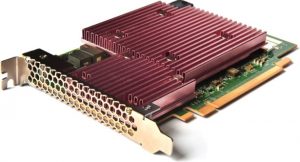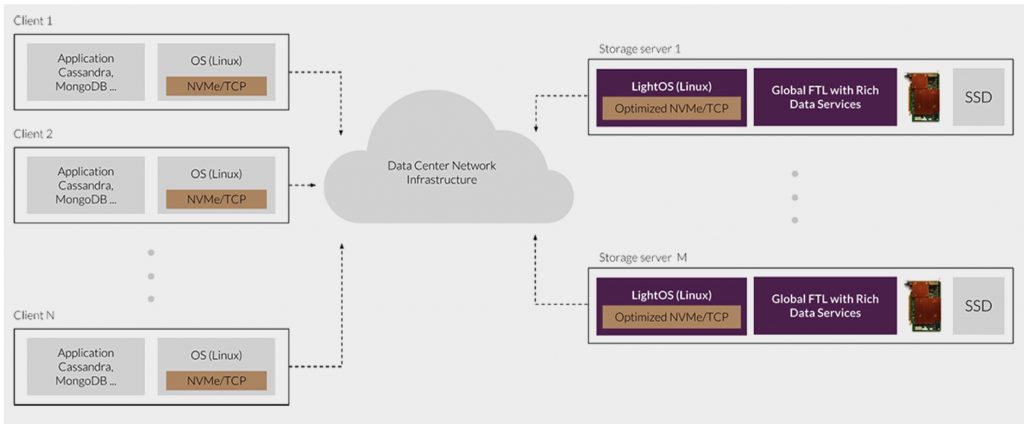$50 million in Funding for Lightbits Labs, in NVMe/TCP Standard
Investors include Dell EMC, Cisco and Micron
This is a Press Release edited by StorageNewsletter.com on March 13, 2019 at 2:21 pmLightbits Labs, the company that championed the NVMe/TCP standard, launched its solution for bringing hyperscale agility and simplicity to data center storage.
This software-defined disaggregation solution helps enterprise private clouds, Software as a Service (SaaS) and Infrastructure as a Service (IaaS) providers save amounts of time and money while enabling higher application performance and public cloud grade hyperscalability.
The company recognizes the opportunity created by combining newly-available affordable flash solutions with high-performance standard networks. Its LightOS software and LightField storage acceleration card are the first NVMe/TCP solutions to provide a Global Flash Translation Layer (GFTL) running over high-performance standard networks.
“Data center storage underutilization has reached epidemic and expensive levels,” said Eran Kirzner, Lightbits Labs CEO and co-founder. “By unlocking the full value of NVMe, we’ve changed the playing field for private clouds. Our customers – private cloud and SaaS providers – can now capitalize on the best of both worlds: the application performance of using local NVMe SSD with the simplicity and efficiency of hyperscale.”
In the data center, converged infrastructure deployments with direct-attached SSDs have constrained ratios of storage to compute, leading to underutilized resources. The result is lost capital and operating expenditures, including power consumption, real estate and more. Reducing or eliminating stranded resources represents significant cost savings.
LightOS software and the LightField storage acceleration card provide a high-performance, end-to-end disaggregation solution that can scale without requiring any changes to clients or network infrastructure. The result is that cloud infrastructures can now achieve optimal scale at low TCO. With LightOS and LightField, application owners can utilize truly composable storage that is indistinguishable from low-latency DAS SSDs. By transitioning from fast, but inefficient, DAS SSDs to disaggregated NVMe storage, users will enjoy a fast cloud infrastructure with higher storage utilization at scale.
By harnessing multiple NVMe SSDs in one large pool, the LightOS GFTL boosts performance and delivers rich data services while enhancing the endurance of commodity SSDs. LightOS and LightField optimize application performance by supporting millions of IO/s at latencies that are similar to DAS SSDs.
Lightbits Labs enters the market with approximately $50 million in funding, with investments from marquee strategic investors including Dell EMC, Cisco Systems, Inc. and Micron Corp.
“NVMe over Fabric allows customers to share high performance NVMe-based storage across servers, but the implementations available to date have required custom hardware and/or software on the server-side that can make these configurations complex to scale and manage,” said Eric Burgener, research VP, infrastructure systems, platforms and technologies group, IDC. “A new option, based on the NVMe over Fabric standard and the TCP transport, uses the standard Ethernet adapters and drivers that ship with all industry-standard servers and requires no custom content in attached servers, making it not only much easier but much less expensive to share high performance NVMe storage. Vendors like Lightbits Labs that make these solutions available are opening up the opportunity for NVMe storage to be much more widely shared in enterprise environments, and IDC expects NVMe over Fabric deployments to begin to ramp based on the availability of TCP transport options.”
LightOS is a software-defined storage solution that provides following attributes:
• Easily integrates into existing data center infrastructure, without touching the network or clients
• High performance and low latency storage with linear scalability
• Shared pool of NVMe storage accessible via standard networking infrastructure
• Runs on off-the-shelf servers (Intel, AMD, or ARM based) with standard NVMe SSDs
• Designed for operational efficiency and ease of use
• Suitable for container-based environments
• Provides data services such as line-rate erasure-coding to protect against SSD failures,
data reduction through compression, thin provisioning, multiple QoS levels, and
more.
• Enhances endurance of the SSDs while delivering more consistent latencies than direct-attached
SSDs.
LightField storage acceleration card

LightField is a PCIe storage acceleration card that speeds LightOS’s NVMe/TCP target and GFTL. It is available for those customers who desire performance at low TCO.
Features include the following:
• Seamless integration with the LightOS software stack
• 200Gb/s line rate compression/decompression and erasure-coding
• Hardware DMA acceleration engines for peer-to-peer data shuffling between SSDs, offloading
SSD garbage collection management and data movement from the storage server’s CPU cores
• Hardware scatter/gather engines for zero-copy network-to-storage data transfers that
accelerate NVMe/TCP
• Data parity engine for offloading data protection services
• Future proofing through re-programmable and extendable user-defined in-storage processing functions
Zachary Smith, co-founder and CEO at IaaS provider Packet, said: “With Lightbits technology, we can provide network attached NVMe devices with ‘as good or better’ performance characteristics as local NVMe. Doing this over our existing Ethernet-based network with standard 10/25GbE network cards is a game changer versus other solutions in the market.“
A Fortune 500 SaaS cloud service provider said: “On standard server-hardware, Lightbits outperforms the most expensive flash-array solutions we have in our infrastructure at a fraction of the cost while providing a delivery mechanism that provides universal access to our entire server-fleet with no compromises. Universal access to NVMe flash in our data centers is a key goal for 2019 and Lightbits is one of the leading solutions to getting us there.“
“We are constantly on the lookout for innovations that could extend the value of the VMwareCloud Foundation to industries and customers more broadly,” said Christos Karamanolis, VMware, Inc.‘s fellow and storage CTO. “Lightbits is a VMware partner that delivers storage-compute disaggregation using NVMe over TCP/IP networks and a global FTL software layer that optimizes for performance and endurance. The technology holds great promise for customers looking to extend hyperconverged infrastructure to environments that are served by traditional storage products today.“
Available, LightOS and LightField have been tested in cloud data centers. LightOS can be purchased separately as a software-only solution or purchased as a bundle with the LightField hardware accelerator.
About the NVMe/TCP Standard
Lightbits Labs, Facebook, Intel, Cisco, Dell EMC, Micron and others collaborated on the NVMe/TCP standard, which was ratified by NVM Express as an approved transport layer for NVMe in November, 2018.
As the storage industry’s pioneer in NVMe/TCP, Lightbits helped drive the standardization effort and worked closely with NVM Express and its member companies, including taking a role in the initial development of the standard specifications.
Designed to layer over existing software-based TCP transport implementations as well as future hardware accelerated implementations, NVMe/TCP lets large-scale data centers utilize their existing, ubiquitous TCP/IP infrastructure to realize NVMe’s performance benefits.
Read also:
Lightbits Labs Celebrates NVM Express Ratification of NVMe/TCP Transport Standard
NVMe/TCP pioneer developed initial specifi and showcased first hyperscale NVMe/TCP storage platform at UNH-IOL NVMe Plugfest.
December 11, 2018 | Press Release
FMS: Lightbits Labs Demonstrated Hyperscale Storage Platform for NVMe OverTCP
To replace iSCSI protocol as communication standard between compute servers and storage servers and become default protocol for disaggregated storage
August, 17 2018 | Press Release













 Subscribe to our free daily newsletter
Subscribe to our free daily newsletter
